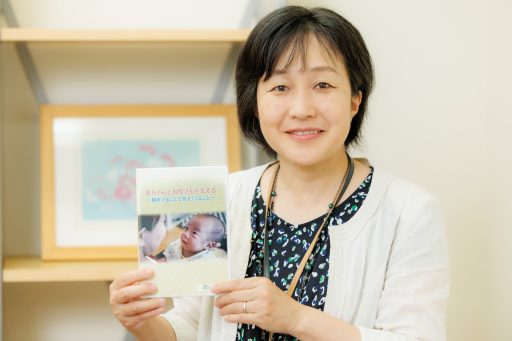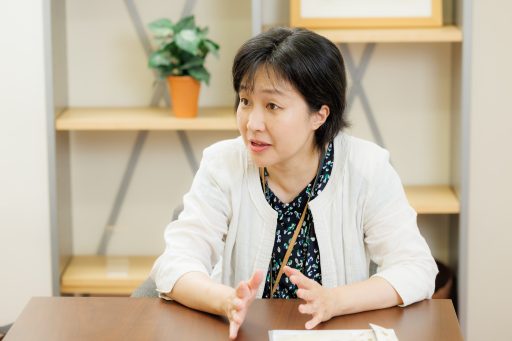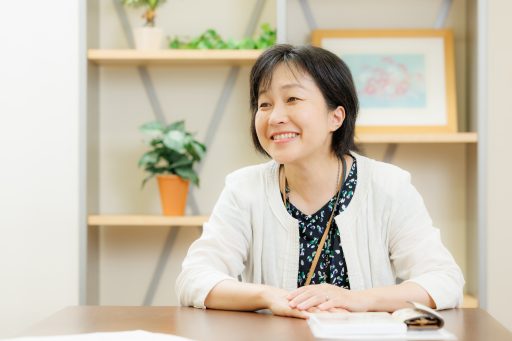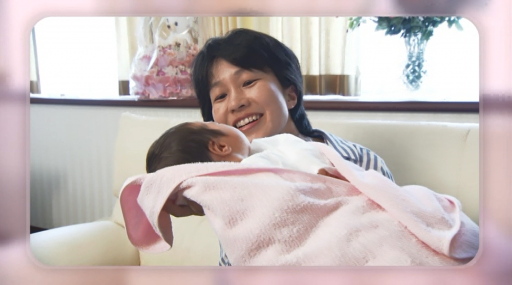Special Interview_What is a baby really like? What can one learn about babies and families through numerous encounters and in-depth sharing with them?

Masako NAGATA (Ph.D)
Psychological Development and Family Division, Psychological Support and Research Center for Human Development, Graduate School of Education, Nagoya University
——
Prof. Nagata specializes in perinatal to early childhood family support and clinical care for developmental disorders. She is also an NBAS Master Trainer certified by the Brazelton Institute. In addition to writing and presenting her research papers, she has produced an educational DVD titled “Supporting Babies and Mothers: What Observation Can Show Us” (in Japanese) and organizes a range of training programs to accumulate and disseminate her clinical knowledge. In April 2024, Prof. Nagata was appointed Vice President at Nagoya University.
——
“Surprisingly, people don’t know much about babies.”
What would it take to really get to know a baby? Needless to say, we are not entirely ignorant about or powerless vis-à-vis babies. In fact, we have learned to save many babies’ lives over the years. In Japan, about 27% of newborns died around 1950.(1) Today, the percentage is down to 0.8%.(1) While the work should continue until the ultimate goal of 0% is attained, we can fully appreciate changes in the social environment, medical advances, and the tireless efforts by healthcare professionals that have brought about the progress.
And the birth of a new life is the beginning of life. As the rate of newborns being saved increased, a new area of research came into focus around 1990: a study of mothers and fathers who grow as persons along with their babies and support for them and others around them. Paying close attention to the baby’s innate strengths and accumulating and sharing resultant findings—these endeavors constitute steps to truly getting to know a baby.
(1)e-Stat (Japanese government website publishing statistical data), Vol. I, 6-2, “Annual data on the number of neonatal deaths by sex and neonatal mortality rate (per 1,000 live births), sex ratio of neonatal deaths and the percentage of neonatal deaths among infant deaths” (survey conducted in 2023, published [updated] on September 17, 2024).
● Simply being there can provide moral support
When Prof. Nagata was a student, she was a member of a research group studying university-based support for children with severe mental and/or physical disabilities and their families. Through the group’s activities, she met many parents in challenging situations.
“They told me how hard it was just after their children were born, how they simply wished for someone who would listen to them.”
In those days, the healthcare community, especially in medical institutions that had many cases of premature babies requiring special care and support, was gradually realizing the need for psychologists who would look after mother-child mental health, which could not be fully covered by medical professionals alone. In 1995, upon completing graduate school, Prof. Nagata entered the field, the neonatal intensive care unit (NICU) at a general hospital, with which she had built ties through her previous activities. At that time, however, she only worked on a voluntary basis once a week because neonatal psychological care was still in its infancy with no fixed posts.
Things were not easy on the ground. In those days, psychologists without medical qualifications were in a limbo of a sort. While physicians and nurses busily performed their medical duties, babies kept crying, and the parents were only given extremely limited visiting time with their babies. Psychologists were not allowed to touch the babies or treat them in any way. Prof. Nagata recalls: “I just felt helpless, and it was like this for a long time.” Even so, she was grateful that she had been accepted as a psychologist; otherwise, it would have been impossible to set foot in the NICU. She was encouraged by the doctors who worked alongside her and her supervisors who said: “Hang in there; you’re doing something important. Do what you believe is necessary; I’ll take full responsibility for whatever you do.”
“So I said to myself: I can’t run away; the parents won’t run away from their babies.”

Here is a story of a family that Prof. Nagata cannot forget. A baby was born at the 25th week, weighing less than 1,000 grams. The baby had intracranial hemorrhage, and intensive medical care was provided. On the fourth day, the mother asked for the discontinuation of treatment. This upset the medical professionals, who were feeling hopeful about the baby’s vitality. They wondered: Should we give up on this life? However, Prof. Nagata touched the mother’s heart at that time. She thought she heard in the words the mother squeezed out amid so much pain and emotion, with no easy way out, the most sincere appreciation of the baby’s life.
“In the past, my baby might have been stillborn. He is alive now, attached to a life support system and with a lot of medical attention. You may say it’s the baby’s vitality. But how can you say that when in fact he can’t stay alive on his own without a respirator? The medical team’s mission may be to save life no matter what, but the life saved, we must live it ourselves, with permanent disabilities, for good. How could you say, ‘We’ve done our job, now it’s your turn’? I feel like throwing these chairs at the incubator, and I don’t care if that kills my child…” (2)
The mother was in full acceptance of this small, fragile life that could disappear at any moment, so much so that the immense weight of this baby’s life was palpable to everyone present.
“’I want to take him home… I want to place him between us on our bed, to sleep together like many families do. But that will kill him,’ said the mother and broke down. ” (3)
The mother did not ask for the discontinuation of medical care without serious thought. The medical team and the psychologist worked out a plan to secure a place where the parents could spend time with the baby. The baby would eventually go home to live with the parents, although the brain damage would remain.
A psychologist’s role in cases like this is to closely accompany the parents in a way that leads to concrete support measures. This is the essence of a psychologist’s role, which cannot be fulfilled otherwise. It is not easy for a psychologist to build a relationship of trust that allows the baby’s mother, father or other parental figure to share their innermost feelings, having taken a deep look at themselves. In the case cited, Prof. Nagata began by meeting and listening attentively to the mother, who had earlier been evaluated to be a straightforward person. She stayed by the mother’s side and listened to her during her meetings with the medical team. She accompanied the mother during her visits with the baby and later discussed with her any perceptible change in her behavior. If the parents fell silent during the meetings, she shared that silence with them, patiently waiting for them to gather their thoughts. She stayed with them, even if no words came out. She went through this process over and over again and shared her findings with the medical team. Eventually, the baby went on to live with the parents, as a family.
Prof. Nagata says: “What a privileged role I play. There are cases where the parents seem to reject me during the most difficult period, and years later when I run into them, they tell me that my presence and words back then actually brought them a lot of support and comfort. When I hear such remarks, I feel encouraged, feeling that my work has not been for nothing.”

(2)Inochi to mukiaukoto, Kokoro wo kanjirukoto –rinshosinri no genten wo toraenaosu
Supervised by Shuji Goto, and co-edited by Masako Nagata and Miwako Hori, Nakanishiya Shuppan, published on May 24, 2023, p.34 – 35
(3) Ibid., p.35
● The babies and the parents are all right.
Prof. Nagata became more seriously interested in babies after having worked at the hospital as a volunteer for a year, observing babies and their diverse strengths and personalities. The timing was good since she had just been hired as a part-time clinical psychologist and become determined to make it her career.
She looked for objective ways to observe babies in great detail, and the Neonatal Behavioral Assessment Scale (NBAS), developed by Dr. T. Berry Brazelto, a pediatrician, came into the picture. She had heard of the method through her research and headed for Nagasaki to attend an NBAS training course at Nagasaki University. The course was a by-product of Dr. Brazelton’s visit to the Goto Islands in Nagasaki Prefecture for his comparative culture research.
As babies develop, they become aware when someone is talking to them and learn to tilt their head, turning their attention to the person. Normally, babies get increasingly better at this. Such a seemingly natural yet important gesture is among many signs of infant development, which could be overlooked. NBAS is used to observe a baby’s, especially a newborn’s, state of development by focusing on four main aspects of development: autonomous nervous system balance, motor performance, the regulation of sleep, wakefulness, and other states of consciousness, and the ability to interact with the outside world.

What do the stress signs that a baby shows mean? What responses are necessary, and when? Posing such questions makes it much easier to understand a baby’s behavior than if a baby is vaguely observed. Sharing this kind of information within the family also makes it possible for the entire family to closely evaluate the baby’s personality and growth. Prof. Nagata continued to clinically apply NBAS, engage in activities to disseminate it, and use it as a research method. In May 2024, she was officially certified as an NBAS Master Trainer by the Brazelton Institute at Boston Children’s Hospital.
In recent years, progress has been made in risk management concerning babies’ and mothers’ wellbeing, including the prevention of abuse and postpartum depression. Meanwhile, too much emphasis on the risk aspect of infant development and parenting can only add to families’ anxiety. Some parents wonder if they are in a bad way simply because a psychologist wanted to talk to them. Prof. Nagata hopes to see positive changes in the way young parents deal with babies and receive support.
“To be sure, there are risks for both the baby and the parents. Still, I hope people realize that they are in fact very powerful. Instead of just worrying about the risks, I want people to know that they can get off to a good start by having a warm, caring heart.”
●Research on babies up to now and going forward
Some 30 years have passed since Prof. Nagata began her activities, and the importance of perinatal psychological care is being recognized today, as attested to by the placement of psychologists in 80 to 90% of the healthcare establishments providing perinatal care. In 1997, six people, including Prof. Nagata, formed a small group called the Perinatal Clinical Psychologist Network, which has now spread nationwide with a total of 241 members as of March 2023. The younger generation of psychologists trained and active in respective regions across the country is gaining power and playing central roles in the Network.
For any type of organization, however important its activities may be, it is not easy to start from scratch and expand to such a scale. Among the numerous endeavors that Prof. Nagata has taken up along this long path are writing research papers and presenting them at scientific conferences.
“You can’t change the situation just by mumbling about your work to those around you. Evidentiary accumulation has been essential.”
Strongly encouraged by her superiors at the hospital, Prof. Nagata continued her research in parallel with her clinical duties. Her many research achievements include some large-scale surveys, such as a study of the relationship between infants’ temperament and child-rearing stress, with the presence/absence of siblings and birth order taken into consideration,(4) and a study of the relationship between maternity blues and maternal attachment to babies born in normal full-term birth.(5) Incidentally, she met the founding members of the Perinatal Clinical Psychologist Network at the scientific conferences she attended. Her vigorous research and communications have certainly changed the situation.
Nevertheless, given the persistent difficulty in collecting data, research on newborns is still considered to have just begun.
“I still learn a lot by listening to specialists from various domains, including medicine, psychology, and neuroscience. In this sense, I think perinatal psychological care represents an interdisciplinary research field where people from many different domains can get together for discussion. I would like us to put our findings together to build a solid body of knowledge to determine what influences newborns’ development in what way and what kind of support should be provided and how, to achieve what outcomes.”
Therefore, Prof. Nagata intends to continue clinical care and learn from it while pursuing research to improve clinical care.
“I believe good research is about taking something intuitively understood on-site but couldn’t quite put into words, and systematically theorizing or documenting it so that everyone can say, ‘Yes, that’s exactly it!’ I hope to continue such research.”
(4) Shuji Honjo, Rie Mizuno, Miyoko Ajiki, Atsuko Suzuki, Masako Nagata, Yumie Goto, Takanori Nishide (1998). “Infant temperament and child-rearing stress: birth order influences”. Early Human Development, 51: 123-135
(5) M. Nagata, Y. Nagai, H. Sobajima, T. Ando, Y. Nishide1, S. Honjo (2000). “Maternity blues and attachment to children in mothers of full-term normal infants”. Acta Psychiatrica Scandinavica, 101: 209-217
(Interview and text by Tatsuro Ayatsuka)
